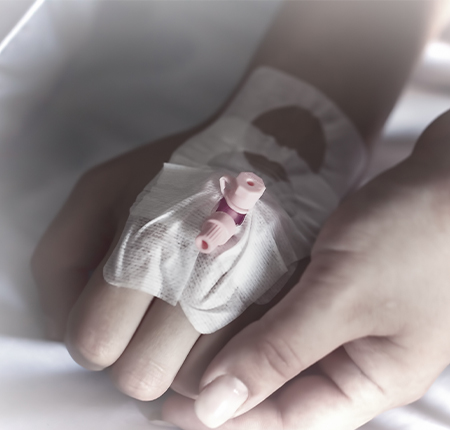
Arm yourself with patience and trust, because today we are talking about a more sensitive topic: miscarriage. We know it's a situation no mother-to-be wants to be in, but that's exactly why it's important to be as well informed as possible.
Find out what are the causes of a miscarriage, how it manifests itself, how long it takes to recover but also how it affects the ability to get pregnant again in the future.
What is miscarriage?
The natural and unexpected loss of pregnancy before reaching 20 weeks is called miscarriage. About 10% to 15% of pregnant women experience a miscarriage according to statistics, and 80% of these pregnancy losses occur in the first trimester. I told more about the baby's development by trimester HERE .
It is a difficult time and, often, a real trauma for the expectant mother and her family or close people. Guilt often comes into play, but the truth is that most miscarriages cannot be controlled. It happens simply because the fetus stops developing. Psychological counseling is sometimes necessary to overcome such a loss.
Causes & risk factors of miscarriage
Before we tell you what are the most common causes of miscarriages, we want to draw attention to the fact that they cannot be controlled. There are, indeed, risk factors that it's good to know so you know what to watch out for or what your doctor should watch for. Among these factors we find:
Infections or exposure to certain diseases
Hormonal imbalances
Disorders of the immune system
Kidney disease, heart disease, thyroid problems or diabetes
Abnormalities of the uterus or improper implantation in the uterine lining of the fertilized egg
Early dilatation of the cervix
Severe malnutrition
A body weight that is too low or too high
Rh incompatibility of the mother with that of the baby
Certain medications
Smoking
Consumption of alcohol and other harmful substances
Age too young (under 20) or too old (over 45) of the mother
The radiations
Excessive stress

But in most cases, miscarriage doesn't happen because you did (or didn't) do something, which is why it's so difficult to prevent. So no woman should blame herself for a spontaneous pregnancy loss - it simply cannot be controlled.
Having said that, below are the most common causes of miscarriage:
Causes of spontaneous abortion in the first trimester of pregnancy
In the first trimester of pregnancy, the most frequent cause of spontaneous abortion (in approx. 50% of cases) is chromosomal abnormalities. Chromosomes are those cellular structures that transmit genes and define the child's physical characteristics (ex: sex, eye and hair color, etc.).
During fertilization, two sets of chromosomes come together. At this point it may happen that for reasons still unknown, the fetus does not receive enough chromosomes, or receives too many, depending on the number of chromosomes in an egg or sperm. In such situations, the pregnancy will not develop normally, and the mother will suffer a miscarriage.
Other common causes of miscarriage in the first trimester are:
- Problems with the placenta
- Mother's age
- Obesity
- Smoking or excessive consumption of coffee, tobacco or other substances
Causes of spontaneous abortion in the second trimester of pregnancy
In the second trimester of pregnancy, miscarriage is most often caused by chronic health problems of the mother. The risk of pregnancy loss increases further if these conditions are not treated. These include hypothyroidism and hyperthyroidism, diabetes, kidney disease, and severe high blood pressure.
Also, spontaneous abortion in the second trimester can also be a result of:
Infections: with HIV, chlamydia, gonorrhea, syphilis, bacterial vaginosis, malaria or rubella
Food poisoning: with salmonella (often from eating raw or only partially cooked eggs), toxoplasmosis (from eating uncooked or partially cooked infected meat) or listeriosis (from unpasteurized dairy products such as soft cheeses)
Certain medicines: especially retinoids (to treat acne), misoprostol (to treat stomach ulcers) or methotrexate (for rheumatoid arthritis)
Uterine structures: when there are structural problems or abnormalities or uterine fibroids
Loose cervix: because it can dilate too early
Polycystic ovary syndrome (PCOS): is associated with infertility and is therefore considered a possible cause of miscarriage.
Miscarriage - Signs and Symptoms
In the case of a missed miscarriage, there are no symptoms and the mother does not know that she has lost the pregnancy until the ultrasound confirms it.
In other cases, spontaneous pregnancy loss can be manifested by:
If you notice such symptoms, it is important to visit your doctor as soon as possible.

Can a miscarriage be prevented?
In most situations miscarriage cannot be prevented - precisely because this situation is not caused by the actions of the mother.
The best thing you can do to prevent pregnancy loss as much as possible is to avoid risk factors and take care of your body, trying to keep it in the best condition. This means to:
You show up for each consultation, according to the doctor's instructions.
You are treating any infections or illnesses you are suffering from that could put your pregnancy at risk.
Adopt a balanced lifestyle and a healthy diet.
Maintain a healthy body weight.
Avoid tobacco, alcohol consumption, excess coffee and other risky substances.
Administer prenatal vitamins as recommended by your doctor.
You exercise regularly, adapted to your level.
Possible diagnoses in case of a miscarriage
Depending on how the symptoms accompanying the pregnancy loss manifest themselves, spontaneous abortion is divided into several types. Thus, depending on how the pregnancy stopped developing, the doctor can make a diagnosis of:
Biochemical miscarriage: the diagnosis is made only on the basis of the decrease in the level of HCG, without an ultrasound. This type of pregnancy loss usually occurs in assisted reproductive technologies during the first 6 weeks.
Treatment of spontaneous abortion
After a miscarriage, it is important that the fetus along with all the remains of the pregnancy is removed from the uterus so that further complications are prevented.
If this happened naturally, no further measures will be necessary. Otherwise, if there are still remnants in the uterus, your doctor may recommend one of the following approaches:
Wait another two weeks for the uterus to naturally eliminate the fetal tissue. It is usually recommended in case of incomplete miscarriage.
Medical treatment, by administering drugs that help to remove the tissue by opening the cervix. It is recommended if you do not want to wait, or if there is still tissue at the end of two weeks.
Surgical treatment by dilation and curettage, respectively surgical removal of tissue under general anesthesia. It is recommended if complications occur, or if the tissue has not been completely removed by medical treatment.
What happens after a miscarriage?
After a miscarriage, slight discomfort accompanied by spotting or light bleeding are normal symptoms. Heavy bleeding, fever, chills and severe pain are not normal and should be reported to the doctor immediately, as they may indicate an infection.
Until the bleeding stops, it is good to use hypoallergenic absorbents made of clean ingredients. Enroush absorbents contain only 100% organic cotton and natural fibers, no synthetic fibers or chemicals that can increase the risk of irritation and infection. Choose the level of absorption you need to feel permanently protected.
The doctor will also advise you not to insert anything into the vagina for the next two weeks. That means avoiding tampons, sex toys, and vaginal sex until your body is fully recovered.
As for life and fertility after a miscarriage, most of the time they will not be physically affected. The risk of the miscarriage recurring is small (under 5%), and two weeks after such an event it is possible to become pregnant again.

Miscarriage FAQs
And yet, how long does bleeding last after a miscarriage and how quickly will you recover? How much does it affect your chances of getting pregnant in the future? You can surely think of a lot of such questions, so below we will answer the most common of them:
How common are miscarriages?
According to statistics, between 10% and 15% of confirmed pregnancies end in miscarriage, and more than 80% of these occur in the first trimester.
But the age of the mother also matters a lot. Statistically, miscarriage was seen in 1 in 10 pregnancies in women under the age of 30, in 2 in 10 pregnancies in women aged 35 to 39, and in 5 in 10 pregnancies in women aged over 45 years.
What causes a missed miscarriage?
There can be many causes of a missed miscarriage, and the most common are genetic problems. The growth and development of the fetus can also be affected by environmental factors, such as the negative emotions that the mother experiences (anxiety, depression, fear, excessive stress, etc.).
Why didn't I know? What are the signs of a missed miscarriage?
It's normal if you didn't know you lost the pregnancy when you had a missed miscarriage. This is by definition symptomless, and the only signs are those that are usually not worrisome: spotting, light bleeding or very mild cramping in the abdominal area.
Only the doctor can detect a missed pregnancy loss, through an ultrasound that can no longer detect a heartbeat.
How long does it take to recover from a miscarriage?
Most women can resume their normal activities after only 1-2 days after the natural or surgical removal of the pregnancy tissue. If there were complications, full recovery may take up to 1-2 months. The doctor will recommend that you avoid sexual contact and the introduction of any object into the vagina (including tampons) for 2 weeks.
It is important to know that all these data are indicative, and each woman will recover at her own pace. The emotional impact of a pregnancy loss is very strong, so the mental recovery can take much longer than the physical one, and may need the support of a specialist.
Is it difficult to get pregnant after a missed miscarriage?
Not. Theoretically, you can get pregnant 2 weeks after a miscarriage, and 87% of women who have gone through such a situation later managed to carry the pregnancy to term with a normal birth. Most miscarriages are caused by a chromosomal abnormality, not the mother's infertility. So there's a good chance you'll get pregnant even if you've had a miscarriage.






















